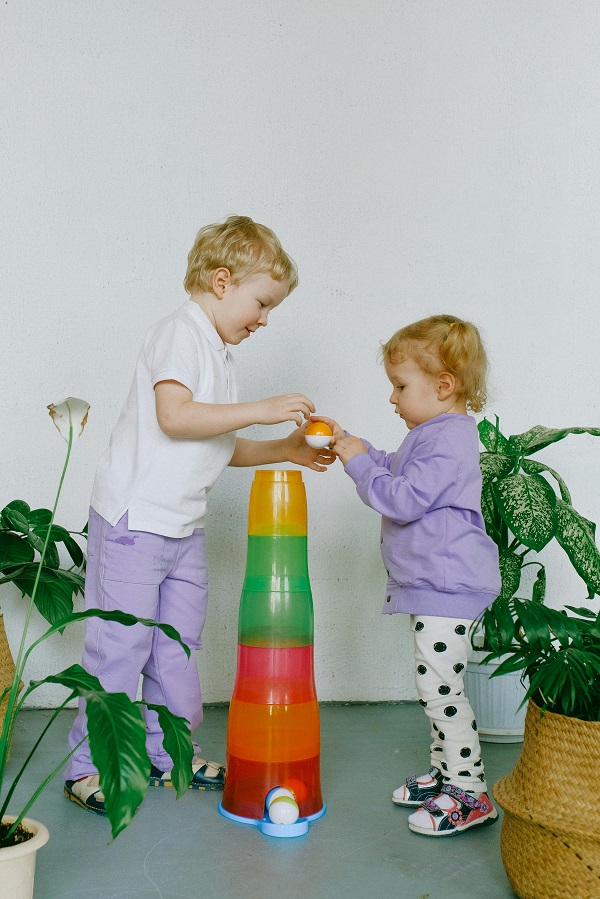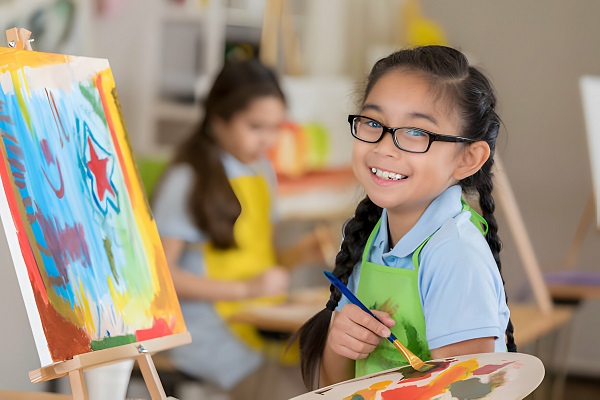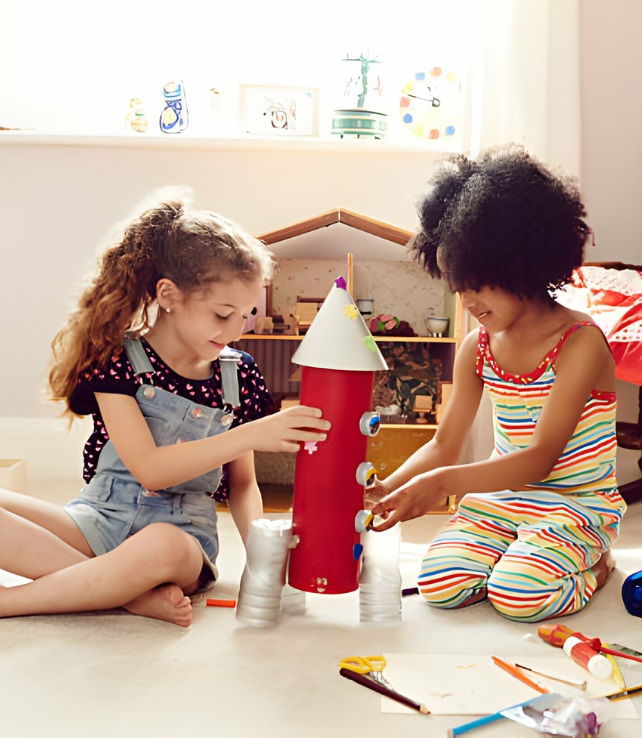Last Updated on January 2, 2025 by Emma
To foster creativity in children, provide them with diverse experiences, and encourage exploration and imaginative play. Engage in creative activities together to nurture their creative skills and maintain a supportive environment at home.
Childhood is a crucial time for developing creativity, and parents play a vital role in nurturing this aspect of their children. As a parent, fostering creativity involves creating a stimulating environment that encourages curiosity, exploration, and self-expression. By providing opportunities for artistic expression, encouraging problem-solving, and valuing novel ideas, parents can inspire their children to think creatively and develop their unique talents.
In this guide, we will explore practical tips and strategies to help parents foster creativity in their children effectively.

Creativity In Children
Encouraging creativity in children is vital for their growth and development. Parents can foster creativity by engaging in imaginative play, providing diverse art supplies, and encouraging open-ended exploration. By creating a supportive and stimulating environment, parents can cultivate a child’s creative potential and nurture their ability to think outside the box.
Discover More – Navigating the Challenges of Single Parenting: Tips And Tricks
Exploring The Concept Of Creativity
Understanding creativity in children is essential for parents who want to nurture this innate ability. Creativity is more than just drawing or painting—it is a way of thinking and problem-solving that allows children to express themselves and explore their imaginations. In simple terms, creativity is the ability to generate new and original ideas or concepts.
Creative thinking involves divergent thinking, which is the ability to see multiple possibilities and perspectives. It also involves convergent thinking, which is the ability to analyze and evaluate ideas to determine the best solution. By encouraging creative thinking, parents can help their children develop crucial skills such as critical thinking, innovation, and adaptability.
When children engage in creative activities, they are not bound by rules or limitations. They are free to experiment, make mistakes, and learn from them. This process of exploration and experimentation fosters curiosity and a willingness to take risks—a vital aspect of creativity.
Benefits Of Fostering Creativity In Children
Fostering creativity in children has numerous benefits that extend beyond the realm of art and imagination. By nurturing their creativity, parents empower their children with skills that are invaluable in various aspects of life.
| Benefits of fostering creativity: |
|---|
| 1. Enhances problem-solving abilities |
| 2. Boosts self-confidence and self-expression |
| 3. Develops resilience and adaptability |
| 4. Stimulates critical thinking and innovation |
| 5. Improves communication and collaboration skills |
When children are encouraged to think creatively, they learn to approach challenges with an open mind and find innovative solutions. This enhances their problem-solving abilities and equips them with the skills necessary to thrive in an ever-changing world.
Furthermore, nurturing creativity helps children build self-confidence as they develop their unique voice and express themselves through various forms of art and self-expression. This self-assurance translates into other areas of life, empowering children to actively participate in discussions and share their ideas.
Moreover, creativity nurtures resilience and adaptability, allowing children to navigate through obstacles and setbacks with a positive mindset. They learn to view challenges as opportunities for growth and are more likely to persevere in the face of adversity.
Creative thinking also promotes critical thinking and innovation, as children are encouraged to question, analyze, and evaluate ideas. This ability to think critically and come up with fresh perspectives is crucial in problem-solving, decision-making, and leadership.
Lastly, fostering creativity helps children develop effective communication and collaboration skills. Whether it’s working on group projects or expressing their thoughts through artistic mediums, children are taught to articulate their ideas and engage in constructive discussions with their peers.
Discover More – The Unfiltered Truth About Balancing Career and Motherhood
Creating A Nurturing Environment
Foster creativity in children by creating a nurturing environment. Encourage open-ended play, provide art supplies, and allow room for imagination to bloom, sparking their creative potential.
Creating a Nurturing Environment is key to fostering creativity in children.
Setting Up Creative Spaces At Home
Provide areas with art supplies and imaginative toys.
Encouraging Open-ended Play And Exploration
- Allow for unstructured play to spark creativity in children.
- Set up a dedicated art corner with various art materials.
- Display their artwork to show value in their creations.
- Create a play space that encourages imagination and exploration.
- Limit screen time to encourage hands-on creativity.
Encouraging Creative Activities
To foster creativity in children, parents can inspire them by engaging in various creative activities. These activities not only stimulate imagination but also enhance cognitive development and emotional awareness.
Introducing Arts And Crafts
Art and craft projects are excellent ways for children to express themselves creatively. Parents can encourage kids to experiment with different materials like paper, paints, and clay to create unique works of art.
Exploring Music, Dance, And Drama
Music, dance, and drama provide outlets for self-expression and creativity. Parents can organize dance parties, musical instrument lessons, or even simple skits at home to encourage artistic exploration.
Fostering Creative Thinking
Discover actionable tips to nurture creative thinking in children with this comprehensive parent’s guide. Explore engaging activities and strategies to inspire imagination and innovation in young minds, fostering a lifelong passion for creativity.
Embracing Problem-solving And Critical Thinking
When it comes to fostering creativity in children, embracing problem-solving and critical thinking skills is crucial. By encouraging children to tackle challenges and find solutions, parents can nurture their ability to think creatively. Children should be given the freedom to explore different solutions, even if they make mistakes along the way. This instills confidence and resilience – essential qualities for creative thinkers.
Encouraging Imagination And Originality
Another effective way to foster creativity in children is by encouraging their imagination and originality. Allowing kids to engage in imaginative play, such as role-playing or storytelling, helps them develop their creativity. Parents can also provide them with various materials like paint, clay, and craft supplies. By experimenting with these materials, children can express themselves and unleash their creative potential.

Supporting Creative Expression
Encouraging and nurturing creative expression in children can lead to numerous benefits in their personal and academic lives. Understanding how to support and promote creativity in your child is crucial to their overall development. Let’s explore some effective strategies for supporting creative expression in children.
Valuing And Celebrating Children’s Creativity
Valuing and celebrating your child’s creative efforts is essential for fostering their innate creativity. When children feel valued, they are motivated to express themselves through various creative outlets and feel a sense of approval for their unique ideas and creations.
Building Confidence In Creative Endeavors
Building confidence in children’s creative pursuits is vital to nurturing their creativity. By providing ample opportunities for them to explore and experiment with different forms of creative expression, you can help them gain confidence in their abilities and develop a positive attitude toward their creativity.
Discover More – Weeknight Wonders: Quick and Healthy Dinner Recipes for Busy Families
Frequently Asked Questions
How Can I Encourage Creativity In My Child At Home?
Encourage creativity by providing art supplies, allowing free play, and praising their efforts.
What Are Some Fun Activities To Spark Creativity In Children?
Engage in storytelling, music and dance, nature walks, and imaginative play to inspire creativity.
Why Is Creativity Important For A Child’s Development?
Creativity fosters problem-solving skills, boosts self-expression, and enhances cognitive development in children.
How Can I Support My Child’s Unique Creative Interests?
Show interest in their creations, provide diverse experiences, and offer resources to explore their interests.
What Role Does Parental Involvement Play In Nurturing Creativity?
Parental involvement enhances confidence, provides positive reinforcement, and nurtures the child’s imagination.
Conclusion
Fostering creativity in children is an essential aspect of their development. By providing them with a nurturing environment, encouraging open-ended play, and introducing them to various art forms, parents can truly ignite their children’s imagination. Engaging in these activities enhances critical thinking, problem-solving skills, and self-expression.
As adults, it is our responsibility to nurture and support their creative journey, allowing them to flourish into innovative individuals. Together, let’s cultivate a future generation that embraces and celebrates creativity.

